- Home
- Frank V. Webster
Bob Hunt in Canada Page 10
Bob Hunt in Canada Read online
Page 10
CHAPTER X
MOCCASINS AS FOOD
Pud made good the next morning, for when Bill woke him he got up atonce, plunged into the lake for an eye opener, and was ready with rodand line as soon as Bill. They were soon out on the lake and Bill madeat once for the trout hole that he had spotted the night before. Theyhad remarkably good luck and returned in time for breakfast withtwenty-five fine trout. These they cleaned and handed to Jack, who soonhad them sizzling on the fire and ready for breakfast. Bob and Mr.Waterman had also gone fishing. They did not return until Jack's cheery"Halloo!" brought they in scurrying. After breakfast they divided intoparties. Bob and Mr. Waterman elected to go hunting partridges, whilethe others said that they would go fishing. Bob and Mr. Waterman weresoon off. Arriving at the far end of the lake, they left their canoesand were soon lost in the depths of the forest. For some time they wentalong, but at last Mr. Waterman noted a partridge, and with a clevershot it was his. They wandered around, climbed a mountain andincidentally got three more birds, two of which Bob had the good fortuneto bag.
"Well, we'd best be going," said Mr. Waterman. "Lead the way."
Bob said nothing, but started off confidently. Mr. Waterman followed onfor a few minutes. He then asked,
"Let's see your compass, Bob."
Bob felt in his pocket, but did not find it there. He then rememberedthat he had left it in his sleeping bag. He was compelled to confess asmuch to Mr. Waterman.
"That's bad dope, Bob," said Mr. Waterman. "You should never leave campwithout your compass nor without first noting carefully in whichdirection you are going."
"I know that," said Bob. "I just forgot it."
"Which direction did we take this morning?" queried Mr. Waterman.
"We first went east to the end of the lake, and since then we have beengoing mainly in a northerly direction."
"That is right," was the reply. "Now, if you can tell me which way issouth, we can at least go in the right direction."
"We're going south now, aren't we?" asked Bob.
"No," Mr. Waterman replied. "We are going north, or nearly so."
He then pulled out his compass and showed Bob that this was so.
"Now, supposing we had no compass, how would we be able to tell thepoints of the compass?" asked Bob.
"By the sun," answered Mr. Waterman, in his usual, quiet way.
"How?" was the query.
"It's quite simple. In this latitude the sun is to the south of us. Wetherefore turn and face the sun, as it is now near noon, and we arefacing south. Behind us is north, to our right, the west and to our leftthe east."
"A woodsman certainly must be on the lookout," said Bob.
Then they turned around and after quite a tramp they came to their ownlake. They reached camp about three o'clock to find it empty. The otherswere evidently still out fishing. They busied themselves about the camp,finally opening out their sleeping bags and lying down on them. In duetime the others returned and showed such a multitude of shining beautiesthat they were amazed.
"This is one of the best lakes we have ever been on," said Jack, as hewent about preparing supper. "The trout are very numerous and of finesize. If we had time it would pay us to stay here a few days and getready some smoked trout to take out with you when you go back to thecity."
"I'd like to do it," said Mr. Waterman, "but I want to carry out myoriginal schedule, so we'll reserve your idea for later on in theseason."
Once more they had a fine supper, consisting of partridge stew withdumplings, trout, biscuits and prunes for dessert. They spent anothervery pleasant evening around the camp fire.
In the morning, after a hearty breakfast, they set out for another lakefarther north and a little to the east.
"I want to work over towards the Escoumains River, so that we can comedown that stream on Friday and get our first taste this season of fastwater," said Mr. Waterman.
"That will be fine," said Bob. "Father has often told me of the excitingtimes he has had shooting the rapids in the Lake St. John region."
They were soon ready for their journey. When they came to the firstportage Pud was the first man out of the boat. He had his dunnage bag onhis back and the canoe on his shoulders, and waited for Jack to show theway. Off they plodded, and in about an hour they came down again toanother fine lake. The guides at once began to make camp, while theothers looked to their sleeping bags and cleared up for the night. Byten o'clock they were settled for the day, and off they went in theircanoes to try their luck on the new lake. They found it just as full offish as the lake they had just left. When they returned at one o'clockthey found that they really had more fish than they could use.
"We'll have to stop fishing for the rest of the day," said Mr. Waterman."There's no use catching trout merely to throw them back again."
"Let's climb some mountain this afternoon and have a good swimafterwards," suggested Mr. Anderson.
After lunch the three boys, with their two mentors, left the camp andmade for the opposite shore of the lake, as the mountain rose up sharplythere. They scrambled up the sides of the mountain and had gotten nearlyto the top when they were startled to see a party of men above them.When they came out on the top they found the strangers there apparentlywaiting for them. Mr. Waterman greeted them pleasantly, but they gaveonly gruff answers. They inquired at first very politely what they weredoing there. Mr. Anderson gave them civil answers, but they evidentlydid not think that his answers were full enough, so they threw off alldisguise, and the leader said,
"We are Government officials, sent up here to see if there are any morestations such as Field had down near your camp. It looks rathersuspicious that you should discover this man Field so opportunely. Wealready know that food you bought in Escoumains has been found in hiscabin."
"Very true," said Mr. Waterman. "As I explained to Mr. MacPherson, thatwas the reason why we went out looking for the thief. It was on thatquest that we found Field and discovered his business. We notified theGovernment immediately, which proves that we were honest in the matter."
"Perhaps it does and perhaps it doesn't," was the reply.
"What you do not know is that we had ferreted out Field's accomplices,and I have no doubt that we would have gotten him in a short time. It ispossible that he knew this and made an arrangement with you to keep himsupplied with grub."
"Nothing of the kind," said Mr. Waterman. "You evidently have not readthe evidence I left with Mr. MacPherson. There I told him all about thescene at the hut, and if you have read that you must know that we knewnothing of Field or his work. All we know is that he stole some of ourgrub and showed remarkable skill in doing so. All through, he was aboutas clever as one could imagine."
"I'll grant that he was clever, and you seem clever yourself," was thereply.
"Don't forget that we'll keep our eye on you the rest of the summer, andthat at the first suspicious move, we'll arrest you," said anotherofficial.
"You will find that totally unnecessary. We have been coming up intothis country for several years, and the delights of nature, the fishing,hunting and adventure are the only things we are after here," said Mr.Waterman.
"I hardly know what to believe," said the spokesman of the party. "Thatman Field was here on just the same plea that you have stated, and untila few days ago he was just as little suspected as you now actually are.Pardon my questioning, but it seemed necessary. We are camping over onLac Corbeau for some time, so if you see more of us do not be surprised.For the present we'll assume that things are just as you state they are.I sincerely hope so, for otherwise it will be a very serious matter foryou."
The two parties then separated, and Mr. Waterman led the way back downthe mountain. They were just in time for a real good swim before supper.Jack had been out and he had gotten four ducks, so that they had a veryfine meal. Duck, trout, biscuits hot from the pan, ginger-bread andapricots made up a meal that would have done credit to Delmonico's, letalone a camp far away in the Canadian wilds. They certainly enj
oyed it.
The next morning they were up early. They were going to get over to theEscoumains River and this meant that they would have to portage throughthree lakes.
"We'll have some hard work this morning, boys, so let's get away asearly as we can," said Mr. Waterman.
"How many portages have we?" asked Pud.
"Three," was the reply.
"It's all the same to me," said Pud. "I'm getting to like the feel ofthat old canoe on my neck. It certainly does not seem half as heavy asit was ten days ago."
"That's because you know how to distribute its weight so that you carryit with head, neck, and arms," said Mr. Anderson. "These canoes areespecially made and they weigh only sixty pounds. You ought to carry thecanoes we used the first year of the Saguenay Club. They were just theordinary canoe and they weighed nearly one hundred pounds and were badlybalanced. These canoes not only weigh less than any other canoes youwill see in this country, but they are especially balanced so that theyare thereby easier to carry."
"I never used any other canoes," said Bob. "Now that I am used to thesecanoes, I do not mind them very much."
"You must also remember that you boys are getting into the finest kindof physical shape," said Mr. Waterman.
"We ought to up here," said Pud. "I've done more real work here the pasttwo weeks than I would do at home in six months. It certainly puts themuscle on a fellow."
Shortly after breakfast they had all their duffle packed and they wereoff. They went along from one lake to another without incident and indue time they arrived at the Escoumains River. By this time it wasnearly two o'clock, so they had a hurried lunch and then started up theriver. Then the boys had a taste of river canoe work that they had neverseen before. It was well that for each of the four canoes there was anexperienced man, for otherwise there would have been plenty of trouble.Before they started the boys were surprised to see the guides come outof the woods with several long poles nicely trimmed up. These they laidin the canoes.
"What's the idea?" asked Pud.
"Of what?" asked Joe.
"The poles."
"We use the pole getting up the rapids. One can go better that way,"said Joe.
"I didn't know that one ever used anything but paddles in canoes," saidBill.
"You'll very soon find how much more power you can get out of the polethan out of a paddle when going up a stream," said Mr. Anderson.
The canoes were pretty well loaded down but the party set out bravely.For some time the river was deep and by hard paddling they made progressagainst the current. Then they came to a rapid. Mr. Waterman got out andwent up the stream. In a little while he returned and stated that hethought they could get up all right if they poled. Then the boys saw howthis was done. Generally they kept near the shore. The man with the polestood in the rear and shoved the boat along. It was necessary to be realclever with the pole, as any one can make sure of by trying thismanoeuver some time in fast water. Finally they got up the first rapid,though frequently the boys thought that they were due for a wetting.When they came to the next rapids Joe told Mr. Waterman that he knewthese rapids well and that it would be necessary to portage. Joe saidthat it was a full hour's portage, meaning that it was nearly two miles.They landed and were soon headed up the stream, laden with their canoesand duffle bags. It was hard work, though they found a well-beaten trailleading up the river. They got glimpses of the cool waters of theEscoumains as it dashed foaming from rock to rock. They could hardlyadmire the scenery, for they were all well weighed down with their packsor canoes. At last they came out at the head of the rapids and found afine sheet of water ahead of them. In fact, as often happens, they foundthe river broad and slow-flowing for several miles, and they made steadyprogress.
"Keep your eye out for a good camping place," said Mr. Waterman. Hardlyhad he said this than they came around a curve of the river and sawbefore them a little opening in the woods that had been cleared. Alittle stream ran down into the larger river, forming a sand bar nearits mouth.
"Here's the place," said Mr. Anderson.
As if by one consent they all steered for the shore and quickened theirstrokes. In a little while they were practically ready for the night. Itwas well that they had stopped, for it was now close to six o'clock andthey were all getting very hungry.
"Hurry up the grub, Jack," said Mr. Waterman. "I could eat a moccasin."
"I eat moccasin before now," said Joe. "It ees hard to chew."
"When was that?" asked Bill, who scented a story.
"It was many year ago, when I very hungry in dees wood," said Joe.
"Let's have the story after supper," said Mr. Anderson.
"Oh, no, it is too difficile for me to speak Engleesh," replied Joe.
"Well, tell it to me," said Bob, "and I can then tell it to the others."
"All right, all right," said Joe, "but you must not expect big story. Itees only what happened to me one long wintaire."
The boys went in for a swim and they found the water a little colderthan the lake on which they had camped the previous weeks. Joe, Jean andJack kept very busy, and it was not long before the noise of a stickbeaten against a tin can made known to all that supper was ready.
"Trout will do us to-night, but to-morrow morning we must have salmonfor breakfast," said Mr. Waterman. "An extra dish of prunes for the onewho catches the first salmon."
This offer does not mean anything to the ordinary person in the city,but on a trip out into the woods where the grub has to be rationed out,fruit of any kind is at a premium. It was almost dark when they gotthrough their supper and were ready for the night. It was quite a coolnight in spite of the hot day they had had. The guides piled on the woodand it was very comfortable after their hard day's paddling andportaging, to sit around the fire and talk over the events of the day orwhatever happened to come up. Bob soon sneaked away from the fire andwent over to the smaller fire which the guides had made close to thelittle wood hut they had hastily thrown up. It did not take Joe long toplunge into his story, and for quite a while Bob stayed with the guideslistening to Joe. When Bob returned to the main party he found themgetting ready to seek their blankets. His return was greeted gladly byBill and Pud, who remembered the story that Bob had promised to get fromJoe and then relate to them.
"Well, how did you make out?" asked Bill.
"Did Joe tell you the story?" exclaimed Pud eagerly.
"Yes, he told me the story in his matter-of-fact way. To him hisexperience was only an ordinary occurrence that may almost be expectedby any hunter in a hard winter. I think that I had better keep the storyuntil to-morrow night, as it is getting late," said Bob, lookingquestioningly at Mr. Waterman.
"Go ahead, Bob," said Mr. Waterman. "We are going to stay here and fishto-morrow, so it won't make much difference if we stay up a little laterthan usual. I don't think that Joe has ever told us of this experience,has he?" added Mr. Waterman, turning to Mr. Anderson.
"No. Joe has told us a lot of very interesting experiences that he hashad, but he never told us of the time he got so hungry that he tried toeat his moccasins," said Mr. Anderson.
"Well," said Bob, "though Joe told me the story in his own very laconicfashion, I am sure that it was much more interesting than I can make it.I'll do the best I can, however."
"All right, then," said Bill, "go ahead."
"When Joe was a young man he once came hunting far north of this countryin the company of an old Montagnais chief named Howling Wolf. Theystarted out late in November, expecting to get back about Christmastime. They went up the Portneuf River, which was frozen over then, andmade good progress. They had very good success from the start. Contraryto what they had generally experienced, the further north they went thebetter was the hunting. They were led on by this unexpected factor to gomuch farther north than they had ever been before. They had three dogteams along and were provisioned for a three months' trip. Their goodfortune lured them on and it was almost Christmas before they awoke tothe fact that they must soon get
started home or they might get intoserious trouble because of lack of provisions.
"Let's see if we can get some deer meat so that we can stay longer,"said Howling Wolf one day. Joe consented and they went out with thisidea in view. They were very successful. They both brought in a deer andat the end of a week, they had quite a lot of meat on hand. Things thuswent along until shortly after Christmas, as sometimes happens, the gamesuddenly became scarce. They could not get a deer or even a rabbit. Inaddition, the winter came on in earnest. One heavy fall of snow wasfollowed by another and they were kept close to their quarters. Theheavy weather continued and they determined to make for the south justas soon as it became possible to do so.
"About the tenth of January, they left for the south. They made goodprogress, though their provisions became lower and lower. At last theywere on very short rations and it was under these conditions thatHowling Wolf had the misfortune to break his leg. Joe bound up the legas best he could, but the injured man made progress all the slower. AsJoe found that the extra burden slowed down the dogs so much in theheavy snow, he determined to cache one load of pelts, make use of theextra dogs and hurry on. Food was very low and if they should hit aweek's storm he could easily see that he would have the greatestdifficulty getting out to Escoumains.
"As bad luck would have it, a regular blizzard came on and for fourdays, Joe and Howling Wolf had to lie low in a rude shelter that Joe hadhastily thrown up when overtaken by the blizzard. It was impossible tokeep a fire burning as the snow came down in icy particles that madewandering from camp a foolhardy undertaking. Howling Wolf on severaloccasions begged Joe to leave him there and go on his way. Like theIndian that he was, he felt that the storm gods were against them and hehad given up.
"Before they left their improvised shelter, Joe had to sacrifice threeof the dogs to furnish food for the other dogs. Joe also stated that hemade his first hearty meal for several days on some dog steaks that hehad kept for himself and Howling Wolf. At last they got away, but on thevery next night they were attacked by a large band of wolves, and thoughthey succeeded in driving them off it was only at the expense of almosttheir last cartridges and the loss of three more dogs. Joe spoke againof the heroism of Howling Wolf, who sat up in his sledge and shot at thewolves, though they threatened to overwhelm him and Joe on more than onerush that they made. Joe said nothing of himself but one's imaginationcan easily picture these two hardy hunters, sheltered only by theirsledges, making a fight for life against a large pack of hungry wolves.
"When the storm was over and the wolves had been driven off, there wereover a dozen dead wolves lying around. Joe stated that knowing that hecould not get the pelts out, he had been compelled to leave the wolvesunskinned. In fact, the most vivid impression made on Joe by this fightfor his very life seemed to lie in the fact that twelve fine wolf skinshad to be left there. The further loss of the dogs made it necessary forJoe to cache all the rest of his pelts. He did this very reluctantly,for he felt that unless he could get back before the winter was over, hewould lose all the fine skins they had gotten by their hard work. Then,with hardly any grub and only a few cartridges, one dog team and a bigheavy Indian with a broken leg as a load, Joe started off forEscoumains, at least one hundred and twenty miles away.
"When Joe told me this, he did so in just as matter-of-fact a way as ifit were the most ordinary occurrence for a man to find himself far tothe north in the depth of winter, practically without grub and withoutammunition. The latter was really practically useless anyway, for theheavy snow seemed to have sent everything alive into their winterburrows. Joe could not take time to go hunting anyway, but he felt itwould be useless, for though he kept his eyes alert, he did not cross asingle track. Bad luck seemed to follow their journey out just as goodluck had urged them further and further north.
"Another heavy storm came on and for three days Joe was compelled to liequiet waiting for the weather to break. By this time the grub hadentirely disappeared and only two dogs were left. Though the stormstopped in the middle of the night, Joe got his two Eskimo huskies outof their snow beds, hitched himself to the sledge also and started on.By the end of that day they had covered nearly thirty miles, accordingto Joe's reckoning, and both he and the dogs were practically exhausted.There was no food for man nor beast, so Joe once more had recourse tothe dogs. He had to kill one of his favorite dogs. This was the onlypart of the story in which Joe showed any trace of excitement orsentiment. The killing of that favorite dog was evidently a very hardtask for Joe.
"After only four hours' rest, Joe and the only dog left took up theirburden. By this time Howling Wolf was in a regular delirium, caused byhis injured leg and his privations. Joe struggled on all that day andfar into the night. According to his calculations, he traveled nearlysixteen hours. In his naive way, Joe excused himself for not keeping onfarther by stating that his dog finally gave out completely and he hadto stop. With no food again, Joe took to eating the leather straps thathad bound the grub on the sled. Then the dog suddenly went mad shortlyafter midnight and Joe was compelled to shoot him in self-defense. Byhard work, he got a fire and made a good stew of dog's meat. A good mealof this also had a very stimulating effect on Howling Wolf, who quieteddown and went to sleep. Without waiting for the morning, Joe hurried on,but the snow was deep and he made but very slow progress.
"In the intervals between his delirium, the stoic Indian urged Joe toleave him and hurry on. Joe makes no hero of himself, but he refused todo this, stating that they would either both reach Escoumains or neitherof them would get there. In this way, Joe struggled on for two daysmore, living on the remains of the dog. This at last gave out. Joe nowfound himself only twenty miles away from Escoumains and he felt that ifhe could only hold out another day, he might get to some place ofsafety. Thus, starving, but determinedly dragging his injured friend,Joe staggered on. That night he eased the pangs of hunger by chewing onan old pair of moccasins that he found at the bottom of the sled.Howling Wolf also chewed away and cheered on his friend for, though hedid not feel that Joe should still keep on dragging him along, he feltthat if he would do it that it was his duty to keep up Joe's spirits.They both slept a few hours that night and long before dawn Joe wastoiling away.
"At last, tired and exhausted, nature would have her due. Joe becamemerely a driveling maniac, urged along by an insane desire to makeprogress. At times he would wander round and round, but eventually hewould head on straight again. It was late that night that Joe saw farahead a welcome light. This spurred him on and for about half a mile healmost ran. This spurt soon died down and left him so weak that he couldhardly move along. Once or twice he fell but he kept on and was soonwithin hailing distance of the light. He tried to cry out but no soundscame from his exhausted lips. At last, when at the very end of hisphysical resources, he came to the door and knocked He heard a rustlewithin, but even before the door was open, he had fallen down in afaint. When he opened his eyes, he was in the cabin of his good friendAntoine Gagnon, who was bathing his head and feet with hot water andgently urging some hot liquid down his throat. Already Howling Wolf wasseated by the fire and telling the good wife, Gagnon, what a brave manJoe had been and how he had saved his life. When he lifted his head, thewhole family crowded around and praised him for his wonderful endurance.Joe stated that he had to spend a week in that house before he wasstrong enough to walk. Howling Wolf's leg got all right and Joe was soonas strong as ever.
"Three weeks after his almost fatal trip, he was off to the north againwith another Indian and a week or more later returned with the peltsthat had been bought almost with his life's blood. 'But,' concluded Joe,'I would give all the pelts I get in one-two-yessair, three wintaire, ifI not kill my dear dog, Marie, I love so well.'"
"Joe must have been some hardy youth twenty years ago," said Mr.Waterman. "I can assure you that everything he told you was true andprobably even worse than he depicted it."
Pud and Bill were greatly impressed with Joe's story and sat a long timestaring into the fire.
Pud, however, soon realized his own troubles, forhe exclaimed,
"Gee, boys, I'm sleepy. I'm going to turn in."
"I guess you had better, boys. You know, late hours are not on thecamper's schedule," said Mr. Anderson.
Ten minutes later, not a sound could have been heard except the distantcalling of a loon or the low roaring of the river as it rushed along itsrocky bed.

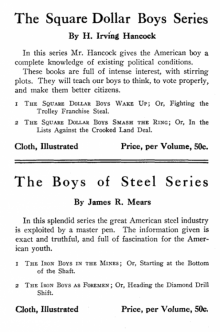 The Iron Boys in the Mines; or, Starting at the Bottom of the Shaft
The Iron Boys in the Mines; or, Starting at the Bottom of the Shaft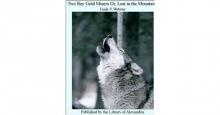 Two Boy Gold Miners; Or, Lost in the Mountains
Two Boy Gold Miners; Or, Lost in the Mountains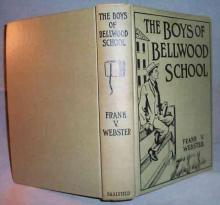 The Boys of Bellwood School; Or, Frank Jordan's Triumph
The Boys of Bellwood School; Or, Frank Jordan's Triumph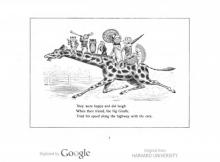 Book of Cheerful Cats and Other Animated Animals
Book of Cheerful Cats and Other Animated Animals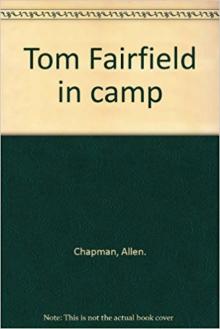 Ralph of the Roundhouse; Or, Bound to Become a Railroad Man
Ralph of the Roundhouse; Or, Bound to Become a Railroad Man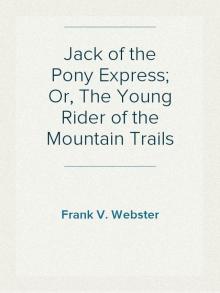 Jack of the Pony Express; Or, The Young Rider of the Mountain Trails
Jack of the Pony Express; Or, The Young Rider of the Mountain Trails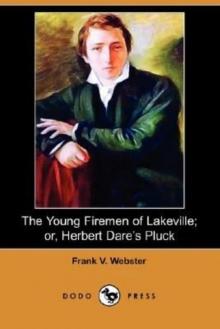 The Young Firemen of Lakeville; Or, Herbert Dare's Pluck
The Young Firemen of Lakeville; Or, Herbert Dare's Pluck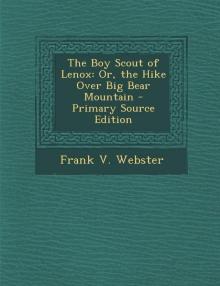 Boy Scouts of Lenox; Or, The Hike Over Big Bear Mountain
Boy Scouts of Lenox; Or, The Hike Over Big Bear Mountain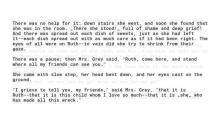 Book of One Syllable
Book of One Syllable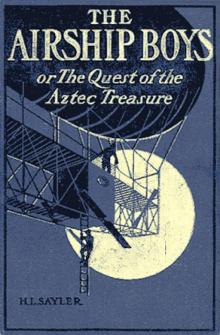 Air Ship Boys : Or, the Quest of the Aztec Treasure
Air Ship Boys : Or, the Quest of the Aztec Treasure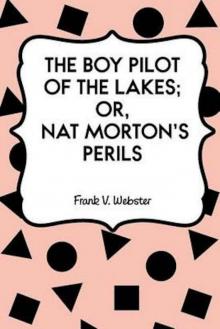 Boy Pilot of the Lakes; Or, Nat Morton's Perils
Boy Pilot of the Lakes; Or, Nat Morton's Perils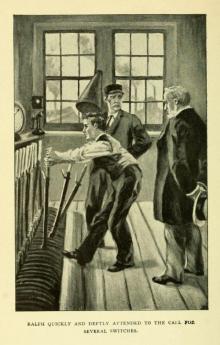 Ralph in the Switch Tower; Or, Clearing the Track
Ralph in the Switch Tower; Or, Clearing the Track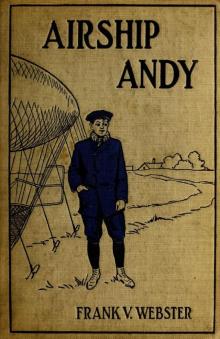 Airship Andy; Or, The Luck of a Brave Boy
Airship Andy; Or, The Luck of a Brave Boy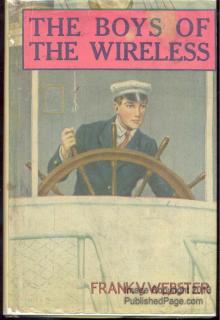 Boys of the Wireless; Or, A Stirring Rescue from the Deep
Boys of the Wireless; Or, A Stirring Rescue from the Deep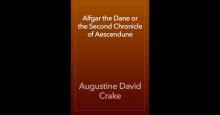 Alfgar the Dane or the Second Chronicle of Aescendune
Alfgar the Dane or the Second Chronicle of Aescendune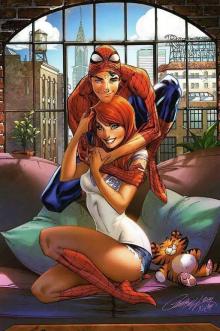 Boy Knight
Boy Knight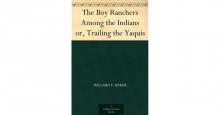 Boy Ranchers Among the Indians; Or, Trailing the Yaquis
Boy Ranchers Among the Indians; Or, Trailing the Yaquis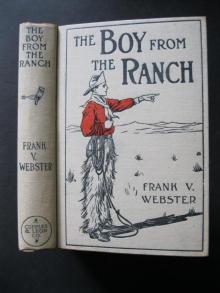 Boy from the Ranch; Or, Roy Bradner's City Experiences
Boy from the Ranch; Or, Roy Bradner's City Experiences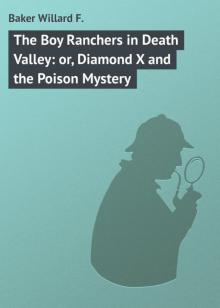 Boy Ranchers in Death Valley; Or, Diamond X and the Poison Mystery
Boy Ranchers in Death Valley; Or, Diamond X and the Poison Mystery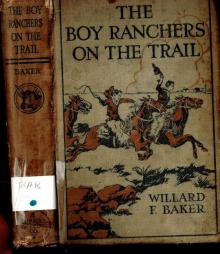 Boy Ranchers on the Trail; Or, The Diamond X After Cattle Rustlers
Boy Ranchers on the Trail; Or, The Diamond X After Cattle Rustlers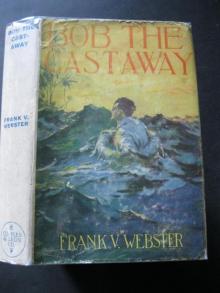 Bob the Castaway; Or, The Wreck of the Eagle
Bob the Castaway; Or, The Wreck of the Eagle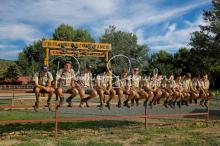 Boy Ranchers in Camp; Or, The Water Fight at Diamond X
Boy Ranchers in Camp; Or, The Water Fight at Diamond X Boy Ranchers; Or, Solving the Mystery at Diamond X
Boy Ranchers; Or, Solving the Mystery at Diamond X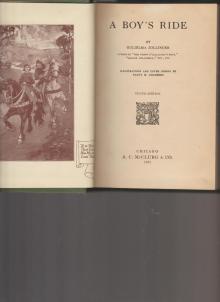 Boy's Ride
Boy's Ride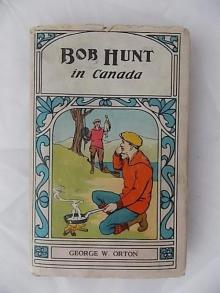 Bob Hunt in Canada
Bob Hunt in Canada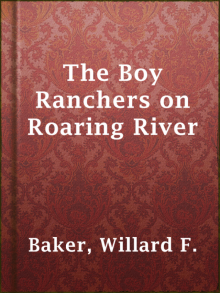 Boy Ranchers on Roaring River; Or, Diamond X and the Chinese Smugglers
Boy Ranchers on Roaring River; Or, Diamond X and the Chinese Smugglers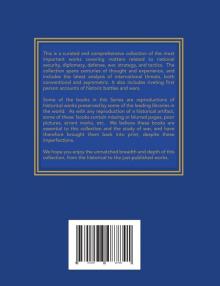 Alida; or, Miscellaneous Sketches of Incidents During the Late American War.
Alida; or, Miscellaneous Sketches of Incidents During the Late American War.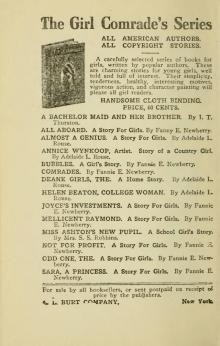 All Aboard: A Story for Girls
All Aboard: A Story for Girls Bob Chester's Grit; Or, From Ranch to Riches
Bob Chester's Grit; Or, From Ranch to Riches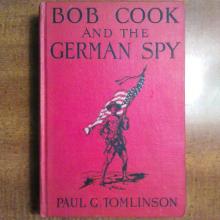 Bob Cook and the German Spy
Bob Cook and the German Spy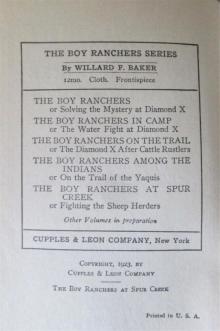 Boy Ranchers at Spur Creek; Or, Fighting the Sheep Herders
Boy Ranchers at Spur Creek; Or, Fighting the Sheep Herders